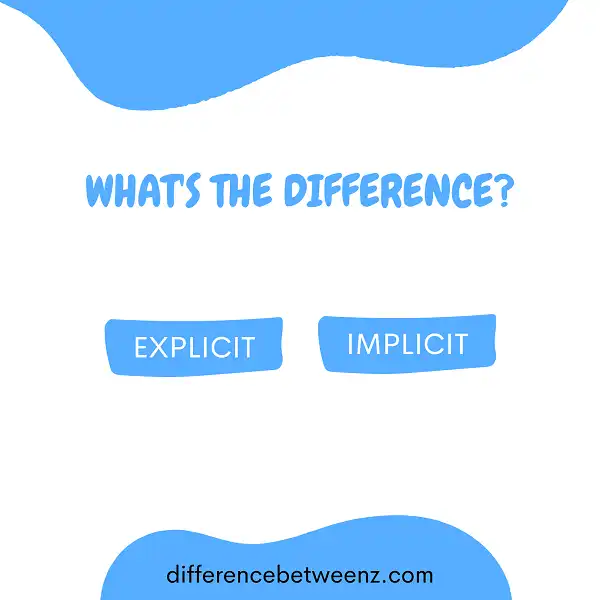Do you know the difference between explicit and implicit? Many people use these words interchangeably, but they actually have very different meanings. In this post, we’ll discuss the difference between explicit and implicit, and give some examples of each. By understanding the difference between these two words, you’ll be able to use them more accurately in your own writing!
What is Explicit?
- Explicit is an adjective that describes something that is clear and specific. For example, explicit instruction is one that leaves no room for interpretation.
- Explicit information is unambiguous and easy to understand. In contrast, implicit information is more vague and open to interpretation. This can make it more difficult to understand, but it can also be more intriguing.
- Explicit information is often preferable in cases where clarity is important, such as when giving directions or providing instructions. However, implicit information can be more effective in cases where you want to leave some room for interpretation, such as in poetry or art.
What is Implicit?
- Implicit is an adjective that describes something that is not said or expressed directly. It can also describe something that is assumed or implied. For example, if someone says “I’m feeling hungry,” the implicit message is that they would like to eat something.
- Likewise, if a child is acting out at school, the implicit message may be that they are feeling insecure or need attention. Implicit messages can be both positive and negative. They can be used to communicate feelings or needs without directly saying so.
- In some cases, this can be helpful, as it can avoid conflict or hurt feelings. However, it can also lead to misunderstanding or miscommunication. Therefore, it is important to be aware of implicit messages in order to avoid misinterpretation.
Difference between Explicit and Implicit
Explicit and implicit are two words that are often used interchangeably, but there is actually a very distinct difference between the two.
- Explicit means something that is plainly stated or expressed, while implicit means something that is inferred or implied. In other words, explicit refers to what is directly said, while implicit refers to what is suggested.
- One easy way to remember the difference between the two is by thinking of the word “explain.” When you Explicitly state something, you are effectively “explaining” it. Meanwhile, when you Implicitly suggest something, you are not explicitly “explaining” it.
- Here’s an example: Suppose you tell your friend, “I’m thirsty.” This is an Explicit statement of your needs. But suppose instead of saying “I’m thirsty,” you say, “I could really go for a cold drink right about now.” This is an Implicit statement because you are not directly saying that you want a drink, but you are implying it.
In general, Explicit statements are direct and straightforward, while Implicit statements are indirect and subtle. When in doubt, though, you can always look up the definition of the word in question to be sure.
Conclusion
Explicit and implicit memories are two different types of memory. Explicit memories are the memories that we consciously remember, while implicit memories are the ones we don’t necessarily remember but they influence our behavior. The difference between explicit and implicit can be seen in how people learn new tasks.
Explicit learning is when a person is taught something and then remembers it later. Implicit learning happens without any conscious effort – for example when someone learns to ride a bike or drive a car. We hope this article has helped you understand the difference between explicit and implicit memory!


